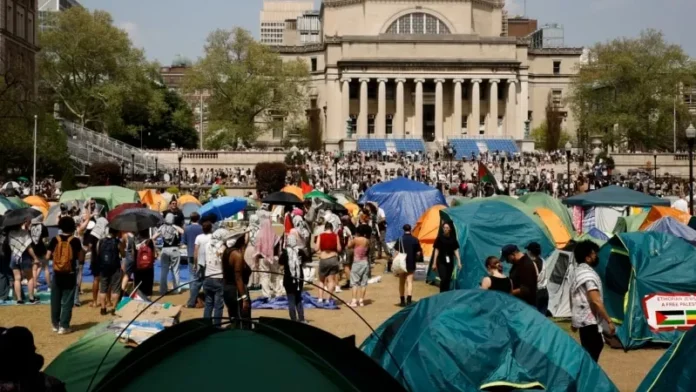As students begin to return to colleges across the United States, administrators are preparing for a potential resurgence in activism against the war in Gaza. After a summer break that provided both student protesters and higher education officials a chance to regroup and strategize, some schools are adopting new rules to limit the kind of protests that swept campuses last spring.
This summer has also been marked by significant changes in university leadership, with some presidents resigning due to their handling of the volatile protests on campus. At Columbia University, President Minouche Shafik recently stepped down after facing heavy scrutiny for her response to the demonstrations on campus. The protests, which began with pro-Palestinian tent encampments in the spring, spread to campuses across the country and sparked clashes with police.
In light of these events, some universities have implemented new policies that limit free speech and the right to protest. The American Association of University Professors (AAUP) has condemned these measures, stating that they could discourage open and vigorous dialogue and debate, which are essential aspects of higher education. The AAUP also noted that many of these policies were implemented without faculty input, raising concerns about academic freedom.
The new rules imposed by universities include banning encampments, limiting the duration of demonstrations, and restricting access to campus for those without university identification. Critics argue that these measures are a form of suppression of free speech. However, university officials maintain that they are simply updating existing rules to protect campus safety and ensure that protests do not interfere with learning.
At the University of Pennsylvania, temporary guidelines have been put in place for student protests, including bans on encampments, overnight demonstrations, and the use of bullhorns and speakers until after 5 p.m. on class days. The university remains committed to freedom of speech, but also requires that posters and banners be removed within two weeks of being put up.
Similarly, Indiana University has implemented an “expressive activities policy” that restricts protests after 11 p.m. and prohibits camping and erecting shelters on campus. The policy also requires approval for signs and banners, which cannot be displayed on university property without prior authorization.
The University of South Florida now requires approval for tents, canopies, banners, signs, and amplifiers. The school’s “speech, expression, and assembly” rules stipulate that no activity, including protests or demonstrations, is allowed after 5 p.m. on weekdays or during weekends, and is completely prohibited during the last two weeks of a semester.
According to Risa Lieberwitz, a Cornell University professor and general counsel for the AAUP, these policies represent a resurgence of repression on campuses that has not been seen since the late 1960s. She also noted that universities should encourage open discussion and debate, even on the most deeply held beliefs.
However, tensions on campuses have been running high since the October 7 Hamas terror attack in southern Israel, which resulted in the deaths of 1,200 people, most of them civilians. The rising death toll in Gaza, which has surpassed 40,000 according to the territory’s Health Ministry, has further fueled student activism, with many vowing to continue their protests into the fall semester.
At Columbia University, about 50 students still face disciplinary action over last spring’s demonstrations, which have been stalled due to an impasse between student protesters and administrators. Mahmoud Khalil, a lead negotiator for the Columbia student protesters, blames the university for the lack of progress, stating that their attempts at dialogue are simply meant to appease the donor community and political class.
The recent resignation of President Shafik sheds light on the challenges faced by university leaders in responding to the protests on campus. Along with other prominent Ivy League presidents who have stepped down in recent months, Shafik faced criticism for her handling of the demonstrations, as well as her response to concerns about antisemitism on campus.
As universities begin a new semester, it is important to remember the value of open dialogue and debate on college campuses. While safety and security are certainly important, it is essential to protect the rights of students to express their opinions and peacefully protest. Let us hope that universities can find a balance between ensuring a safe and productive learning environment and upholding the principles of free speech and expression.

